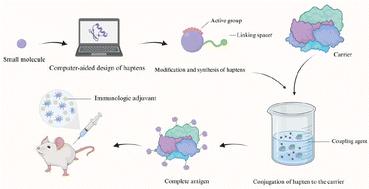Our official English website, www.x-mol.net, welcomes your
feedback! (Note: you will need to create a separate account there.)
Advancements in the preparation technology of small molecule artificial antigens and their specific antibodies: a comprehensive review
Analyst ( IF 3.6 ) Pub Date : 2024-08-14 , DOI: 10.1039/d4an00501e Yaya Chen 1, 2 , Shuo Ma 1, 2 , Meiling Zhou 1, 2 , Yuming Yao 1, 2 , Xun Gao 1, 2 , Xiaobo Fan 2 , Guoqiu Wu 1, 2, 3
Analyst ( IF 3.6 ) Pub Date : 2024-08-14 , DOI: 10.1039/d4an00501e Yaya Chen 1, 2 , Shuo Ma 1, 2 , Meiling Zhou 1, 2 , Yuming Yao 1, 2 , Xun Gao 1, 2 , Xiaobo Fan 2 , Guoqiu Wu 1, 2, 3
Affiliation

|
Small molecules find extensive application in medicine, food safety, and environmental studies, particularly in biomedicine. Immunoassay technology, leveraging the specific recognition between antigens and antibodies, offers a superior alternative to traditional physical and chemical analysis methods. This approach allows for the rapid and accurate detection of small molecular compounds, owing to its high sensitivity, specificity, and swift analytical capabilities. However, small molecular compounds often struggle to effectively stimulate an immune response due to their low molecular weight, weak antigenicity, and limited antigenic epitopes. To overcome this, coupling small molecule compounds with macromolecular carriers to form complete antigens is typically required to induce specific antibodies in animals. Consequently, the preparation of small-molecule artificial antigens and the production of efficient specific antibodies are crucial for achieving precise immunoassays. This paper reviews recent advancements in small molecule antibody preparation technology, emphasizing the design and synthesis of haptens, the coupling of haptens with carriers, the purification and identification of artificial antigens, and the preparation of specific antibodies. Additionally, it evaluates the current technological shortcomings and limitations while projecting future trends in artificial antigen synthesis and antibody preparation technology.
中文翻译:

小分子人工抗原及其特异性抗体制备技术进展综述
小分子在医学、食品安全和环境研究,特别是生物医学领域有着广泛的应用。免疫测定技术利用抗原和抗体之间的特异性识别,为传统的物理和化学分析方法提供了更好的替代方案。由于其高灵敏度、特异性和快速分析能力,这种方法可以快速准确地检测小分子化合物。然而,小分子化合物由于其分子量低、抗原性弱和抗原表位有限,往往难以有效刺激免疫反应。为了克服这个问题,通常需要将小分子化合物与大分子载体偶联形成完整抗原,以在动物体内诱导特异性抗体。因此,小分子人工抗原的制备和高效特异性抗体的生产对于实现精确的免疫分析至关重要。本文综述了小分子抗体制备技术的最新进展,重点介绍了半抗原的设计与合成、半抗原与载体的偶联、人工抗原的纯化与鉴定以及特异性抗体的制备。此外,它还评估了当前的技术缺点和局限性,同时预测了人工抗原合成和抗体制备技术的未来趋势。
更新日期:2024-08-14
中文翻译:

小分子人工抗原及其特异性抗体制备技术进展综述
小分子在医学、食品安全和环境研究,特别是生物医学领域有着广泛的应用。免疫测定技术利用抗原和抗体之间的特异性识别,为传统的物理和化学分析方法提供了更好的替代方案。由于其高灵敏度、特异性和快速分析能力,这种方法可以快速准确地检测小分子化合物。然而,小分子化合物由于其分子量低、抗原性弱和抗原表位有限,往往难以有效刺激免疫反应。为了克服这个问题,通常需要将小分子化合物与大分子载体偶联形成完整抗原,以在动物体内诱导特异性抗体。因此,小分子人工抗原的制备和高效特异性抗体的生产对于实现精确的免疫分析至关重要。本文综述了小分子抗体制备技术的最新进展,重点介绍了半抗原的设计与合成、半抗原与载体的偶联、人工抗原的纯化与鉴定以及特异性抗体的制备。此外,它还评估了当前的技术缺点和局限性,同时预测了人工抗原合成和抗体制备技术的未来趋势。































 京公网安备 11010802027423号
京公网安备 11010802027423号